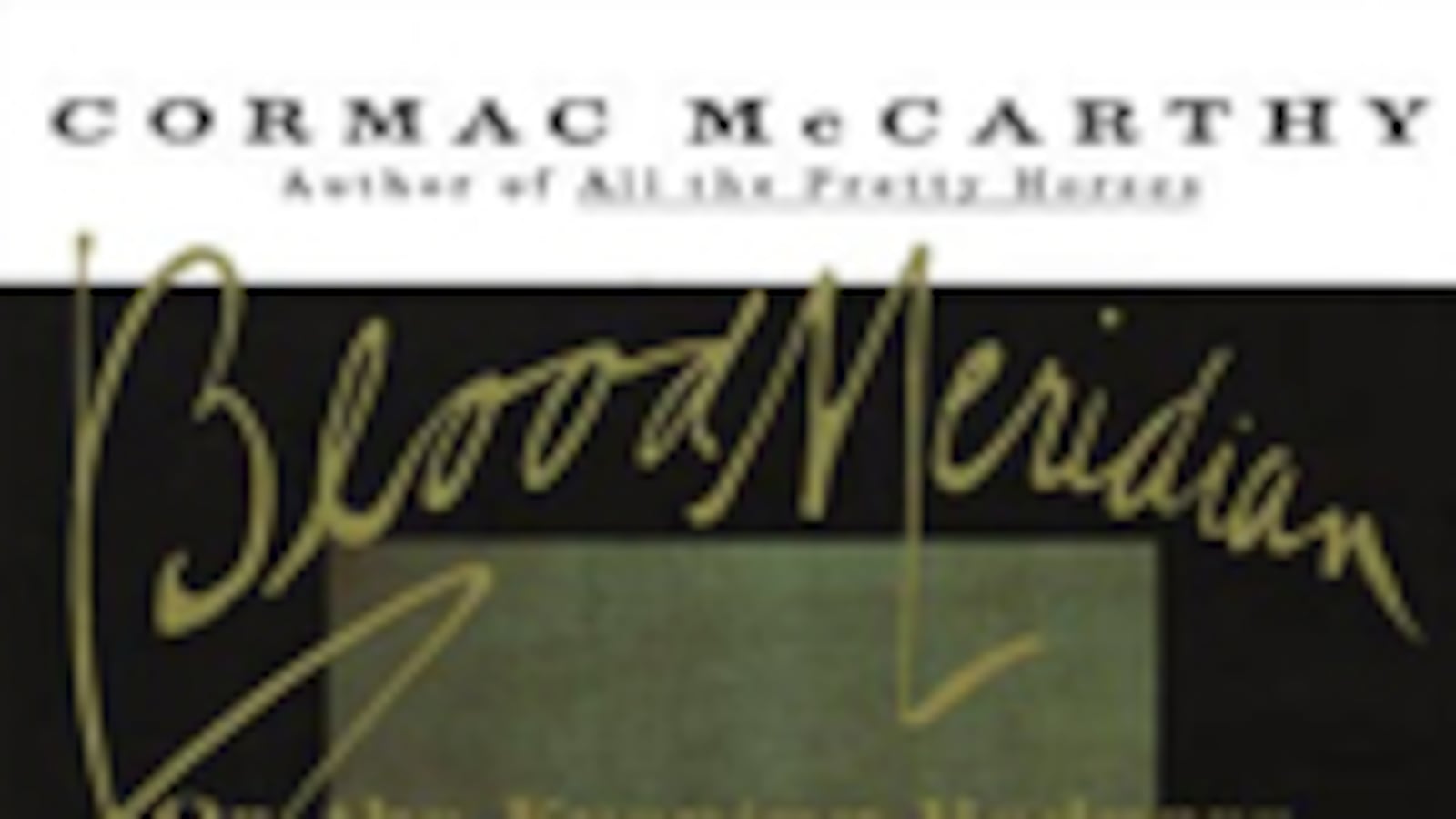
“The North American Western,” sniffed Jorge Luis Borges in his An Introduction to American Literature, “is a tardy and subordinate genre.” Tardy, Borges meant, compared to the rich and complex “poesia gauchesca,” the poetry and stories inspired by the exploits of the gauchos in his native Argentina, and subordinate to the Hollywood Western movie.
Borges wrote that in 1966; it’s shame he didn’t give the Western a second chance before his death in 1986. At the least, he would have discovered two of the most acclaimed of all Westerns, both of which were published in 1985—Cormac McCarthy’s Blood Meridian, Or The Evening Redness in The West and Larry McMurtry’s Lonesome Dove. Both books were eye-openers to Eastern seaboard critics, who still regarded Western fiction as something written by Louis L’Amour. In fact, the last half-century might be called the golden age of Westerns.
The roundup of serious writers who have written Westerns over this span is impressive: E.L. Doctorow’s amusing revisionist take on the pulp Western, Welcome to Hard Times (1960), Thomas Berger’s epic Little Big Man (1964), Charles Portis’s True Grit (1968), which is soon to appear as a Coen Brothers’ film for Christmas release, Michael Ondaatje’s The Collected Works of Billy the Kid (1970), Ron Hansen’s Desperadoes (1979) and The Assassination of Jesse James by the Coward Robert Ford (1983), Pete Dexter’s elegiac twilight-of-the-gods account of Wild Bill Hickok’s last days, Deadwood (1986), Daniel Woodrell’s Woe to Live On (1987), made into Ang Lee’s film Ride With the Devil, Susan Dodd’s heartrending fictional biography of Jesse James’s mother, Mamaw (1988), N. Scott Momaday’s juxtaposing of the legend of a young Kiowa boy with that of Billy the Kid, The Ancient Child (1989), David Thomson’s witty and original Silver Light (1990), which straddles the lines between fiction, film and history by mingling the destinies of real-life Westerners with film characters, Robert Coover’s phantasmagorical Ghost Town (1998), Philip Kimball’s sweet, sad and savage Liar’s Moon (1999), and, this year, Deep Creek by Dana Hand (pen name of Anne Matthews and Will Howarth), a grim and fascinating fictional account of the actual slaughter of Chinese miners in 1870s Idaho.

“The ultimate Western, not to be surpassed,” Harold Bloom calls Blood Meridian in a chapter from How to Read and Why (reprinted as an introduction to the 25th anniversary edition). Whether or not you agree with that assessment pretty much depends on how you regard McCarthy’s fiction overall.
I have always been resistant to the claims for genius by McCarthy-ites. To begin with, there’s a problem of style. An observation Larry McMurtry made about Joyce Carol Oates sums up my feelings about McCarthy: “How many times ... has she buried a small but valuable scene under an avalanche of stylistic snow?”
McCarthy’s style has evolved over the years from what Edmund White called “classy Southern gothic” to what might be termed, at its best, heightened poetic realism and, at its worst, overheated myth-mongering. In All the Pretty Horses (1992), The Crossing (1994), and Cities of the Plain (1998), McCarthy’s prose is so rich and gravid with metaphor that many have been willing to overlook his shortcomings and excesses. In McCarthy’s West, no one knocks at the door of a lonely cabin in the wilderness to ask for a drink of water without getting a treatise on the meaning of life and death. Every other prostitute is named “Magdalena.” (Has there ever been a creditable female character in any of his books?) Mexican pimps are as portentous as Death in a Bergman film. Characters you might think would be as inarticulate as the cast of Jersey Shore say things like “I came here as a heretic fleeing a prior life” ( The Crossing) and “Your world totters on an unspoken labyrinth of questions” ( Cities of the Plain). Unnamed narrators are always asking rhetorical questions like “But what does this say of God?” ( All the Pretty Horses).
Harold Bloom is hell on the Western Canon, but he’s dead wrong about Western novels.
Blood Meridian is the story of a gang of scalp hunters looting and murdering their way through the early Southwest territories. The carnage is practically flip-page. Here are some passages:
“ ... They came to a bush that was hung with dead babies ... These small victims, seven, eight of them, had holes punched in their underjaws and were hung so by their throats from the broken stubs of a mesquite to stare eyeless at the naked sky.”
“There were in the camp a number of Mexican slaves, and these ran forth calling out in Spanish and wee brained or shot and one of the Delawares emerged from the smoke with a naked infant dangling in each hand ... and swung them by the heels, each in turn and bashed their heads against the stones so that the brains burst forth through the fontanel in a bloody spew and humans on fire came shrieking forth like beserkers and the riders hacked them down with their enormous knives ...”
“They were skewered through the cords of their heels with sharpened shuttles of green wood and they hung gray and naked above the dead ashes of the coals where they’d be roasted until their heads had charred and the brains bubbled in the skulls and steam sang from their nose holes. Their tongues were drawn out and held with sharpened sticks thrust through them and they had been docked of their ears and their torsos were sliced open with flints until the entrails hung down on their chests.”
I’m not exaggerating when I say that you can open up any page of Blood Meridian and read for no more than four or five minutes before finding passages that rank with these. Interspersed with the crushed skulls and mutilated genitals are prose-poems.
Borges once admonished a translator of Beowulf for making his creation “more primitive than the original.” That’s how I feel about Cormac McCarthy’s Old West. The new wine of his highly stylized violence explodes the bottle; the reader can’t help but feel that if the West had been this violent, it would have been so depopulated there would have been no one left to settle it. A sequel to Blood Meridian would have been impossible: There would have been no one left to continue the story. The only conceivable title would have been “The Wasteland.”
It’s not difficult to see why Blood Meridian is such a hit with high falutin’ critics like Bloom. Consider enigmatic passages like this: “For this will to deceive that is in things luminous may manifest itself likewise in retrospect and so by slight of some fixed part of a journey already accomplished may also post men to fraudulent destinies.”
Looks as if somebody’s been readin’ The Portable Nietzsche by the camp fire. As the character says in Blazing Saddles, “This is authentic frontier gibberish.”
Bloom calls Blood Meridian “A Western not to be surpassed,” but though many of McCarthy’s later books are set in the West, one wonders how many Westerns he has actually read—Larry McMurtry’s, for instance. McMurtry’s Westerns to be sure, can be jarringly violent, but the violence is always in the context and perspective of the time and place. In his essays on Texas, In a Narrow Grave, McMurtry correctly noted that movie Westerns “fault the myth when they dramatize gunfighting rather than horsemanship as the dominant skill.” I don’t recall a single reference to horses in Blood Meridian except a scene where a herd is slaughtered as brutally as human beings.
The killing in Lonesome Dove is invariably regarded with a wry salty humor of the kind that Mark Twain thought was essential to American storytelling. The famous first sentence, for instance: “When Augustus came out on the porch, the blue pigs were eating a rattlesnake—not a very big one.”
Like McCarthy’s characters, McMurtry’s Texas Ranger Augustus McRae can also be philosophical about killing but without the pretension. “If I’d wanted civilization,” he says to his partner, Woodrow Call, “I’d have stayed in Tennessee and wrote poetry for a living. Me and you done our work too well. We killed off most of the people that made this country interesting to begin with.” Augustus anticipates Freud’s argument in Civilization and Its Discontents by more than half a century.
Both Blood Meridian and Lonesome Dove, also celebrating its 25th birthday with a new edition, are about long journeys through vast, desolate landscapes, but McMurty’s tale is filled with sights and sounds and smells and observations about such mundane subjects as the superiority of biscuits cooked in a Dutch oven compared to those baked in an indoor stove: “A man that depended on an indoor cook stove would miss the sunrise, an if he missed sunrise in Lonesome Dove, he would have to wait out a long stretch of heat and dust before he got to see anything so pretty.” Such observations could only come from a writer who knows the West firsthand and grew up with its traditions.
Harold Bloom is hell on the Western Canon, but he’s dead wrong about Western novels. The ultimate Western is not Blood Meridian, it’s Thomas Berger’s Little Big Man, and right behind it is Lonesome Dove.
Plus: Check out Book Beast for more news on hot titles and authors and excerpts from the latest books.
Allen Barra writes about sports for the Wall Street Journal and the Village Voice. He also writes about books for Salon.com, Bookforum, and the Washington Post. His latest book is Yogi Berra, Eternal Yankee.





